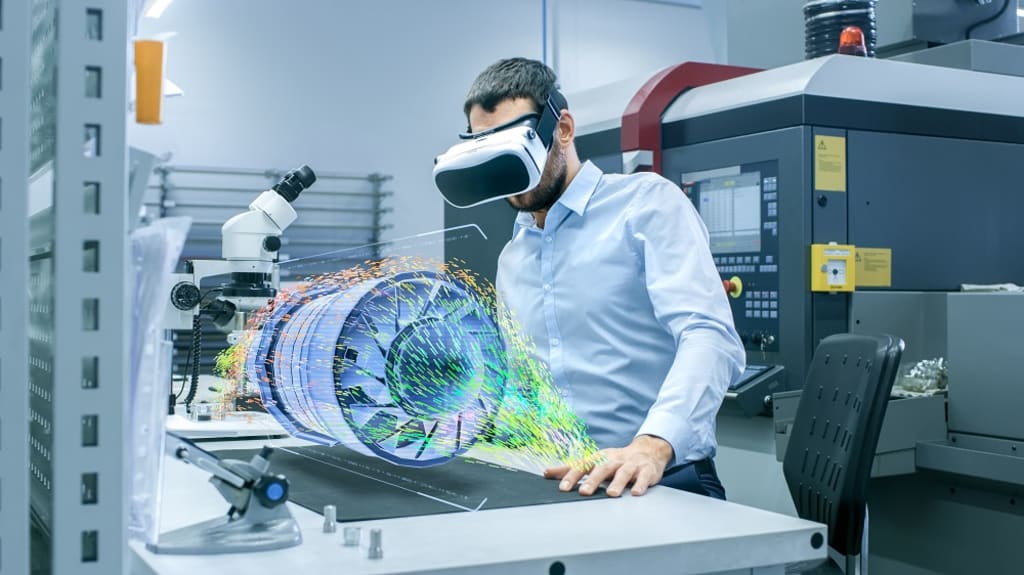Virtual Reality Applications
Virtual

Virtual reality (VR) technology is transforming the way we interact with the world around us. Through VR headsets and immersive environments, users can experience anything from climbing a mountain to exploring a different planet. The applications of VR are wide-ranging, from entertainment and gaming to education, healthcare, and even military training. In this article, we will explore some of the most exciting applications of VR and the implications they have for the future.
One of the most well-known uses of VR is in the gaming industry. With the rise of high-quality VR headsets such as the Oculus Rift and HTC Vive, gamers can now enter fully immersive virtual worlds and interact with them in ways previously impossible. This technology has opened up new opportunities for game developers to create experiences that are more immersive, realistic, and interactive than ever before. For example, in a VR game like Beat Saber, players use handheld controllers to slash through blocks and dodge obstacles in a rhythm-based music game. This type of experience is far more engaging and immersive than traditional gaming experiences and has the potential to change the way we play games.
In addition to gaming, VR technology is being used in a variety of educational settings. In classrooms, teachers can use VR to create immersive learning environments that allow students to explore historical sites, see scientific concepts in action, and experience cultures from around the world. For example, in a history class, students can use VR to explore ancient civilizations or witness pivotal events like the signing of the Declaration of Independence. In a science class, students can use VR to explore the inner workings of cells or observe chemical reactions up close. This type of experiential learning is far more effective than traditional classroom lectures and has the potential to revolutionize education.
Another area where VR is making a big impact is healthcare. VR is being used in a variety of ways, from treating mental health disorders to helping patients recover from physical injuries. For example, VR is being used to treat post-traumatic stress disorder (PTSD) by recreating traumatic events in a controlled environment. This allows patients to confront their fears and anxieties in a safe and controlled way, which can lead to reduced symptoms over time. VR is also being used to help patients recover from physical injuries by providing them with immersive exercises that simulate real-world movements. This can help patients regain strength and mobility faster than traditional physical therapy.
The military is also using VR technology for training purposes. Virtual reality allows soldiers to train in a variety of scenarios that would be too dangerous or expensive to simulate in real life. For example, soldiers can practice urban warfare tactics or defusing explosives in a virtual environment that is both realistic and safe. This type of training is far more effective than traditional classroom lectures and can help soldiers prepare for real-world situations more effectively.
While there are many exciting applications of VR technology, there are also some potential implications that need to be considered. One of the biggest concerns is the potential for addiction. With the immersive nature of VR, users can easily become engrossed in virtual worlds and lose track of time. This can lead to problems with social interaction and other real-world responsibilities. Additionally, there are concerns about the impact of VR on mental health. While VR can be used to treat mental health disorders, there is also the potential for it to exacerbate certain conditions, such as anxiety and depression.
Another concern is the impact of VR on the job market. As VR technology becomes more advanced, it has the potential to replace certain jobs with virtual environments. For example, architects and engineers may be able to design and test buildings in virtual environments, reducing the need for physical prototypes. Similarly, customer service representatives may be replaced by virtual assistants that can interact with customers in a more personalized way. While this could lead to increased efficiency and cost savings, it could also result in job losses for some
Another implication of VR is the potential for it to be used for unethical purposes, such as training for illegal activities or manipulating users’ perceptions. This highlights the need for careful regulation and ethical guidelines to ensure that VR is used responsibly and for the greater good.
Despite these potential concerns, the applications of VR technology are vast and exciting. As the technology continues to evolve, we can expect to see even more innovative uses of VR in fields such as entertainment, education, healthcare, and beyond. For example, VR could be used to create virtual tourism experiences that allow people to explore far-off destinations without leaving their homes. It could also be used to create social platforms where people can connect and interact with others in virtual spaces.
As with any emerging technology, there are both opportunities and challenges associated with VR. However, with careful consideration and planning, we can ensure that VR is used in ways that benefit society as a whole. This requires collaboration between government regulators, industry leaders, and other stakeholders to establish best practices and ethical guidelines for the development and use of VR technology.
In conclusion, virtual reality technology is transforming the way we experience the world around us. From gaming and entertainment to education, healthcare, and military training, the applications of VR are vast and exciting. While there are potential concerns about the impact of VR on addiction, mental health, and the job market, these can be addressed with careful regulation and ethical guidelines. With continued innovation and collaboration, we can ensure that VR is used in ways that benefit society and create new opportunities for growth and development.
About the Creator
Jeno Trashan
Story writer Jeno Trashan creates captivating tales filled with adventure, emotion, and imagination. A true lover of words, Jeno weaves unforgettable stories that transport readers to far-off lands.






Comments
There are no comments for this story
Be the first to respond and start the conversation.